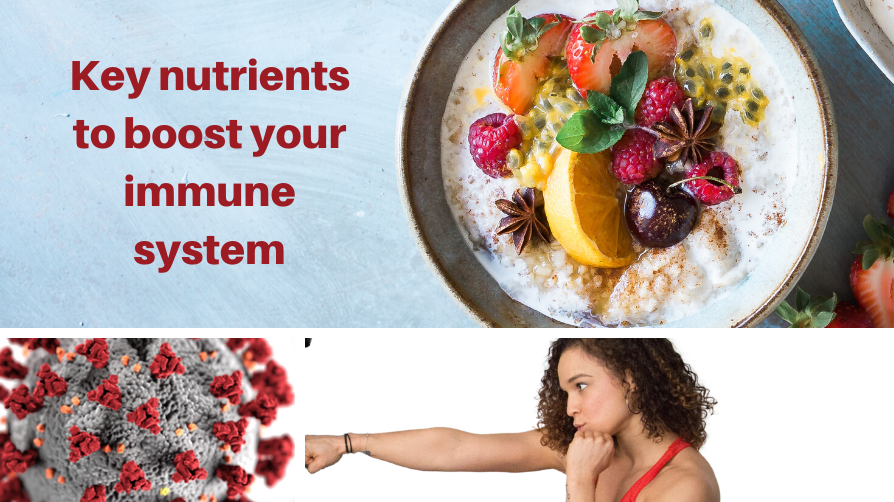
Key nutrients to boost your immune system.
These days, we are surrounded with information on the spread of COVID 19 virus and what measures to take to slow down the spread of this virus. However, a topic I have not yet seen covered in the media is "how we can protect ourselves from possible infection through our food choices". While there is no quick fix and our overall lifestyle influences our immune system’s ability to fight diseases, the following provides some scientific-based nutrition suggestions that could help improve your immune functions.
1. Your gut microbes provide you the best protection, so nourish them:
Regular probiotic intake in the form of plain unsweetened kefir, yogurt or other similar fermented products can help improve your intestinal flora and provide a first line of defence.
This is particularly important if you have recently followed an antibiotic treatment.
Reduce foods that damage your intestinal flora: Simple refined sugars is by far the biggest enemy of your intestinal bacteria, needless to say this habit can provide many other benefits for an overall better health.
Feed your gut microbes with prebiotic by increasing foods rich in fibre, such as banana, artichoke, onion and garlic, beans, oatmeal, whole grain cereals and almost all fruits and vegetables. Soluble fiber is the indigestible part of the food for us, but it serves as main source of food for our intestinal flora. So feed them fibre and help them florish.
2. Vitamin B6 is a coenyzmes that supports immune function
Foods rich in vitamin B6 are legumes such as lentils, peas and chikpeas, as well as all citrus fruits, and most green leafy vegetables, with asparagus having particulary high levels of vitamin B6. Also, most fortified cereals, enriched with vitamin B6 can provide a good source, only if the label indicates vitamin B6 or pyridoxine as one of the ingredients. National recommended intake for an adult is 1.2/day and the tolerable upper intake limit of 25 mg/day.
3. Vitamin A stimulates the production and activity of white blood cells
Vitamin A is found in the fatty part of foods such as eggs, fish, fortified dairy, and liver, which would be best to buy bio as much as possible. Plant sources of provitamin A, also known as beta carotenoids are nutrients that body converts to vitamin A and are found in foods such as: carrots, leafy greens, sweet potato, apricots and cantaloup and dark coloured fruits and vegetables. Vitamin A is a fat-soluble vitamin and taking supplements may risk toxicity, national recommended intake for women are 0.8 mg and men 1.0 mg of vitamin A per day. The tolerable upper intake level is considered to be 3 mg per day.
4. Vitamin E is an antioxidant, free radical scavenger, that enhances our immune function
Vitamin E or alpha tocopherol is generally difficult to find in foods, but most valuable antioxidant for our defence system. Foods such as wheat germ, sunflower seeds/oil, almonds, peanut and soy bean/oil as well as pumpkin, asparagus and green leafy vegetables are good sources, so regular intake of these foods are recommended during this period, and all year long, Same as with vitamin A, vitamin E is a fat-soluble vitamin and taking vitamin supplements has toxicity risk. According to the “DACH reference values for nutrient intake, 2017”, women require 12 mg, men 13 to 15 mg of alpha tocopherol per day. The safe upper intake level for adults is 300 mg per day.
A multivitamin supplement is not necessary the best option as you can enrich your diets with these nutrients naturally through better food choices. This is what we recommend when working with nutriMenu labelled restaurants, advocating nutritionally dense, balanced meals all year.
Here is an example of an immune boosting day:
Breakfast: Start your day with a nice bowl of oats with kefir/yogurt, topped with sunflower seeds/almonds/wheatgerm, banana/ apple, sprinkled with ginger powder and cinnamon
AM snack: A citrus fruit and glass of water
Lunch: A balanced meal, such as a fish in lemon sauce, with whole grain rice and some asparagus or other green vegetables. making sure to respect the recommded proportions in your plate.
PM snack: Another plain yogurt, some nuts or a fruit, letting your hunger signals guide you
Dinner: A lentils/rice (80/20) soup with sweet potatoes and veggies, and a plain yogurt/kefir before going to bed .
Drink water generously:, aim for at least a litre of water a day
References
Swiss nutrient recommendations
Maryam Yepes Ph.D.
Founder of Myravan solutions, Maryam completed her bachelors and master’s degree in Dietetics and Human Nutrition from McGill University, and holds a Ph.D. in Public Health from University of Lausanne. With the aim of improving nutritional quality of meals served in collective and private restaurants, she has developed nutriMenu.ch and is active in consultations, training and nutriMenu certification support for hospitality sector.
